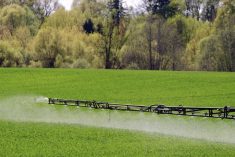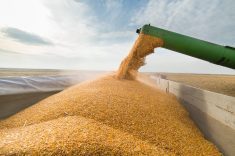Cargill Inc. said Thursday its quarterly earnings fell 82 per cent in the giant U.S. agribusiness firm’s worst quarter in more than 20 years, hurt by volatile commodity markets and weak margins in key areas such as beef and oilseeds.
Full-year results were also seen as disappointing, as both sales and profits from the company’s global food supply businesses were squeezed by soft economies and volatile commodity markets.
The results, the third weak quarter in the last four, were for the three months ending in May, before the worst drought in half a century starting battering grain crops and herds in the U.S. Plains and Midwest. So more challenges lie ahead with the drought, Cargill’s chief financial officer told Reuters.
Read Also

Alberta crop conditions improve: report
Varied precipitation and warm temperatures were generally beneficial for crop development across Alberta during the week ended July 8, according to the latest provincial crop report released July 11.
"It is a significant disruption," said CFO Sergio Rial in an interview. "It will put pressure on U.S. grain exports."
Minneapolis-based Cargill, one of the world’s largest privately held corporations, reported $73 million in earnings from continuing operations for the fiscal fourth quarter ended May 31, down from $404 million a year earlier (all figures US$).
It was Cargill’s worst quarter since the second quarter of fiscal 1991 when Cargill earned $71 million, a company spokeswoman said.
"Cargill’s earnings performance was not up to our expectations, though with notable exceptions," CEO Greg Page said in a statement. "We did not trade as well in this year’s markets, which were driven as much by the economic and political environment as by the fundamentals."
Cargill’s full-year fiscal 2012 earnings fell 56 percent to $1.17 billion from a record $2.69 billion in the prior year, and were well below expectations, the company said.
Fourth-quarter revenues were $34 billion, a two per cent drop from a year ago. Cash flow from operations for the full fiscal year was $3.51 billion, compared with last year’s $4.55 billion.
Fitch Ratings analyst Judi Malter Rossetti said Cargill may be in line for a debt ratings downgrade after the latest report.
"The magnitude of Cargill’s earnings decline for the year provides increased momentum for a ratings downgrade," she said.
"Expense reductions and incremental earnings from recent acquisitions should be positive in 2013, but they may not be enough to compensate for the weak earnings trends and Fitch’s expectations for continued earnings volatility."
Drought effects
Cargill, a leading food processor, grain and meat exporter, and ethanol producer, is a top trader in dozens of commodity markets around the world. Rial said economic turmoil in the European Union around its debt and currency crises was a big factor in the fourth quarter challenges for Cargill traders.
"Our views in the fourth quarter were very solid relative to where grain prices were going to behave," he said. "But that wasn’t necessarily how May behaved and how financial markets behaved in the month of May."
Cargill’s smaller rivals like Archer Daniels Midland and Bunge have seen similar pressures, reporting disappointing earnings for the quarter ended June 30.
But Cargill’s scale of operations is much larger: on the Fortune 500 list of largest U.S. companies, its fiscal 2012 sales of $133.9 billion would rank it number 10, between Bank of America and Ford Motor Co.
Grain prices have soared to records this summer and those effects are likely to show up in fiscal first quarter earnings for June-August. Cargill did not cite any drought effects in its earnings analysis.
But its CEO appeared on television last week to voice support for easing the U.S. government’s mandate to produce rising amounts of ethanol, saying the huge diversion of corn to making the fuel was causing corn prices to soar and squeezing livestock farmers — including Cargill, a big beef producer.
"That absolutely could be negative," Rial said of soaring feed costs. "If you have higher grain prices, your meat businesses are the first ones you need to think about."
Rial said that Cargill’s ability to source commodities globally would be an advantage in coping with the drought.
"We have done a pretty solid job as far as hedges," he said. "Undoubtedly more towards the later part of the year, I would expect pressure, eventually to the entire meat business."
As for sourcing grain exports, Rial said since the last major U.S. drought in 1988, Cargill’s operations in many other grain growing nations had expanded. He cited more Cargill buying in places like Canada, Russia, South America and Australia.
Will that make up for drought losses in the United States, the number one grain exporter?
"I don’t know. What I know for sure is that we are in a lot stronger position in 2012-13 than we were 10 years ago," Rial said.
Volatile markets
Three of Cargill’s five main business earnings were down in the quarter from a year ago: its food-ingredients and animal protein, grain origination and processing, and risk management and financial segment. But annual earnings were down in all five business units compared to the prior year.
A bright spot was the company’s food-ingredient segment which posted a third straight year of record earnings.
Meat businesses were well below last year’s record level due to the cyclical downturn in North American beef, Cargill said. Higher fed cattle prices and other costs squeezed beef profits.
Commodity trading and processing results "were down significantly from last year’s exceptional performance, due in part to losses in cotton and sugar," Cargill said. The business also had lower earnings among the grain and oilseed processing businesses, though with positive exceptions in the Americas.
— Christine Stebbins reports on U.S. cash and futures grains and oilseeds markets for Reuters in Chicago.


















